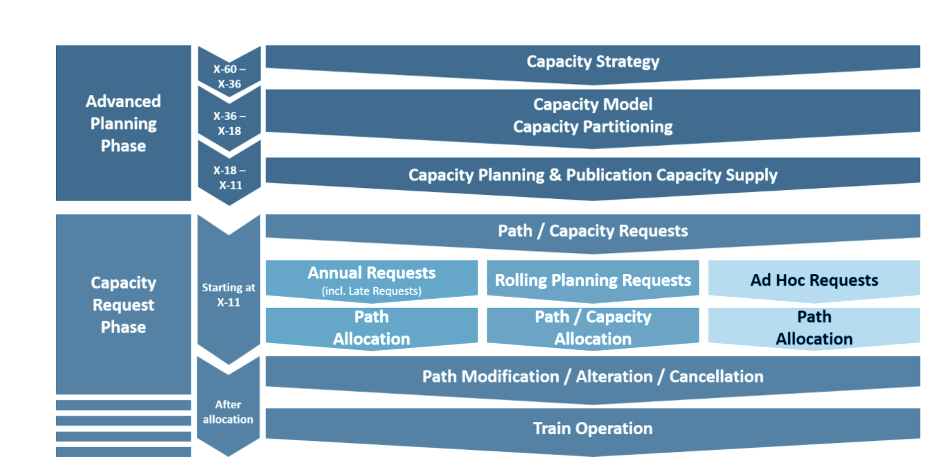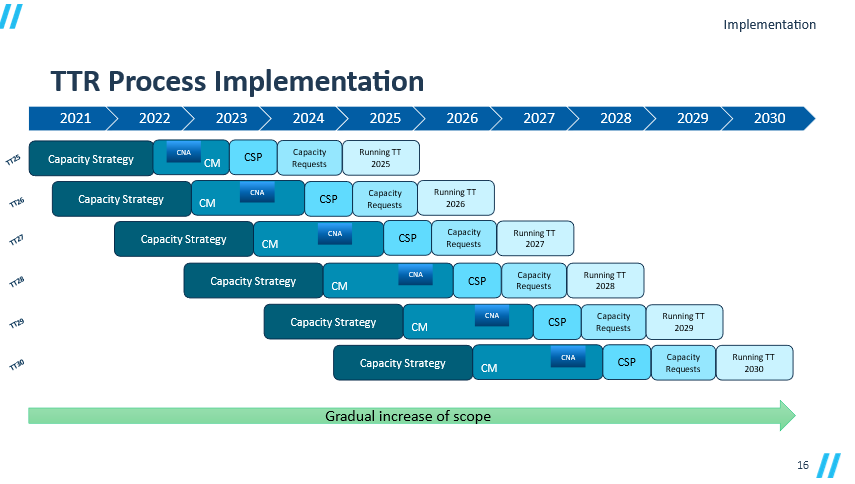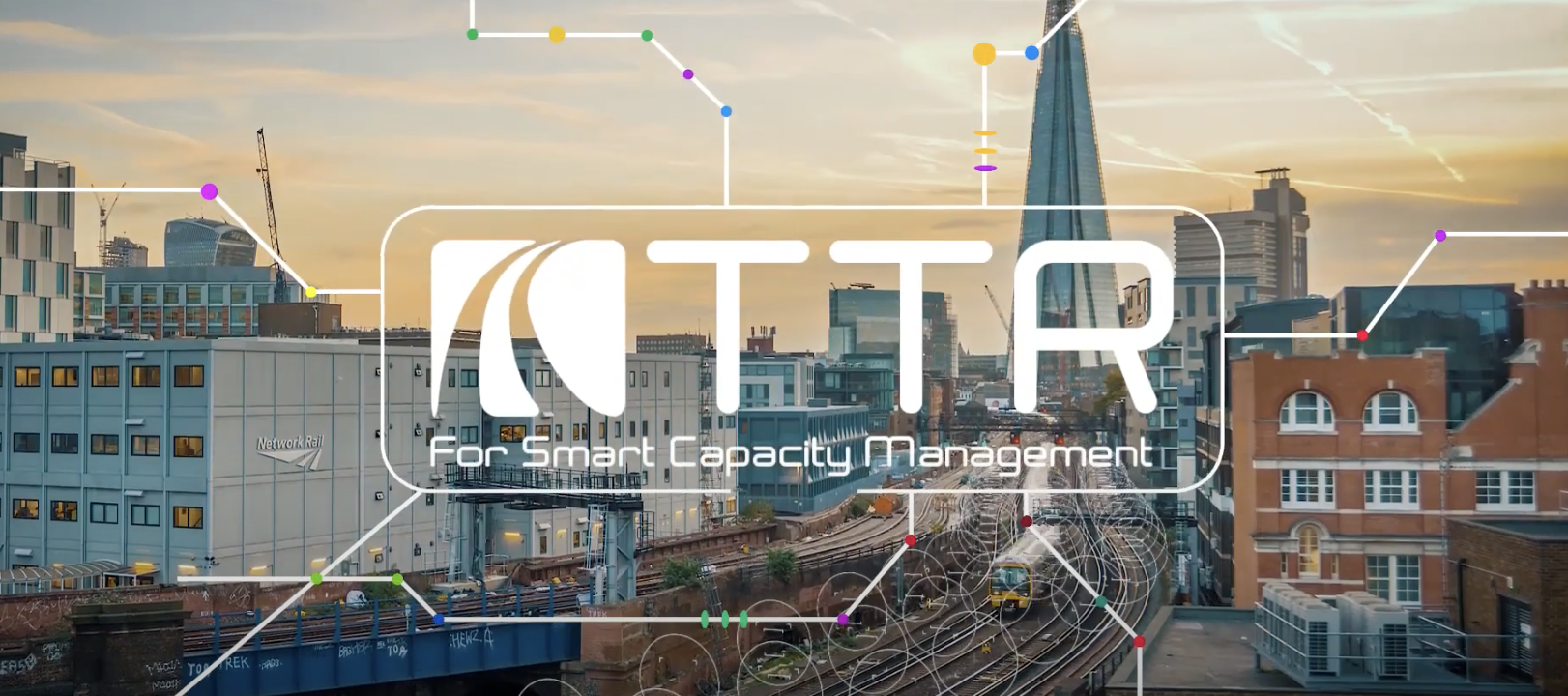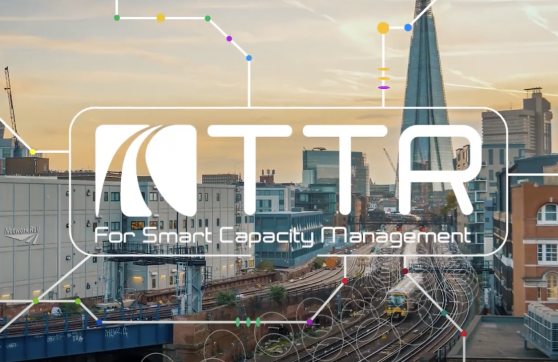With the Timetable and Capacity Redesign Programme – or TTR for Smart Capacity Management – a market-oriented, efficient, digitalised and competitive capacity management process will be introduced to serve both passenger and freight market needs.
To meet this challenge, a TTR project team - consisting of experts from the market, timetables, operations, IT and legal fields, recruited from all stakeholders (RUs, IMs, supporting companies) throughout Europe - sought the views of the market. The market expressed the following needs:
- Flexibility, especially in the freight sector.
- Possibility for earlier commercial use of paths, e.g. earlier ticket sales.
- Reduction of peak loads and redundant work.
- Higher stability and quality of timetables.
Based on this input, the infrastructure managers and the railway undertakings then started to define the possible approaches. After several years of planning within the framework of the TTR project, the timetable finally took the form of an innovative and market-oriented process, based on pre-planning and on processes adapted to the needs of different market segments.
The different process steps can be visualised as follows:

TTR Pilot project Amsterdam-Brussels
Infrabel and Prorail are jointly working on the implementation of TTR, focusing mainly on the lines between Amsterdam and Brussels from 2022, in cooperation with the concerned RUs.
Initially a TTR pilot project but now an exchange platform with a goal to test, adapt and gradually implement elements of the TTR process, based on a capacity model and a harmonised international capacity supply plan. Via this platform international cooperation is assured, and discussions on how to move forward can be done between partners in an open and informal format.
Additional information can be found on the portal (only for participants) or via the RNE website.
The most important impact for applicants at this stage can be described as follows:
- The drafting of a Capacity Model and Supply Plan describing in detail the intended capacity availability for passenger and freight traffic.
- The optimisation of the TCR coordination and linked path alteration procedures.
- The input gathering of future capacity needs via ECMT.
The pilot Capacity Model and Supply Plan can be consulted via the ECMT tool. The goal is that the ECMT tool evolves into a tool which can visualise the available capacity on the European network in a dynamic way, at each point during the timetable process.
For more information, please contact Thomas Vanbeveren (see contact details below – also the National Implementation Manager for Infrabel).
Thomas Vanbeveren
TTR National Implementation Manager Belgium
I-CBE.3
T + 32 2 432 28 08
M +32 492 91 49 76
E thomasgerd.vanbeveren@infrabel.be
TTR@Infrabel
In December 2020, Infrabel's Executive Committee agreed on the gradual implementation of the TTR process, in line with the milestone plan defined and continuously refined via RailNetEurope. This plan foresees in a partial implementation of the TTR process from timetable 2025 onwards. To achieve this, Infrabel has set up a project structure.
The gradual implementation of the TTR process is aligned with the availability of new IT solutions and the adjusted legal framework. This means that the scope of implementation needs to be refined annually to align with the changing framework:
- On the legal side, the European Commission published a proposal for a Regulation on the use of railway infrastructure capacity on 11 July 2023, as part of the Greening Freight Package, meeting the most important challenges of the TTR process. The legislative process is currently under way to formalise the Regulation.
- On IT side, Infrabel is investing heavily in the development of a state of the art IT-solution for planning capacity on our network. We are helped here by European subsidies via the Connecting Europe Facility via the CEF II 2021 funding call. End of 2024, we’ve received the good news that we will receive additional funding for 2024 and 2025 after the extension of the initial Grant Agreement.

TTR is being implemented step-by step, by increasing the scope gradually:

The first implementation step has been taken with the publication of the TTR@Infrabel Capacity Strategy for timetables 2025 to 2028. This document describes the capacity planning principles for the concerned timetable year on the most important axes. From timetable 2027, we publish a draft document at X-39 (mid-September). The final versions are published at X-36 (timetable change).
The Capacity Strategy for timetable 2028 can be found here.
The second step concerns the preparation of a Capacity Model from Timetable 2025. Here Infrabel options for a restricted geographical scope (historic TTR pilot BENE lines). High and major TCRs are visualised and an optimal differentiation between traffic type volumes (passenger/freight/other) is shown. Via ECMT we also test the provision of future capacity needs by the applicants (period X-27 (mid-October) to X-24 (timetable change)) in order to be used during the set-up of the Capacity Model and Supply Plan. More information will follow via capacity related communication channels. The Capacity Model can be consulted via ECMT.
The third step is the publication of the Capacity Supply, in which the volumes proposed in the capacity model are presented in detail through proposed catalogue paths, cadences and indicated TCRs.
Infrabel remains committed to the development and deployment of TTR. We will keep you informed of the various stages of implementation. For all your questions, please contact our national implementation manager.

